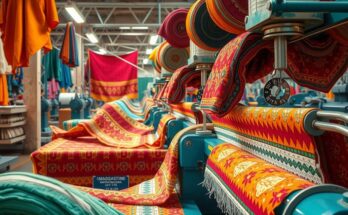U.S. tech firms are facing increasing challenges due to renewed tariffs imposed by President Trump on Chinese imports, with costs rising significantly for American businesses. Firms like Austere, led by Deena Ghazarian, are especially impacted as they navigate pricing pressures and potential retaliatory actions from other countries. The long-term viability of these companies is uncertain amidst ongoing trade tensions and economic challenges.
Deena Ghazarian, owner of the California-based company Austere, encountered severe challenges due to President Donald Trump’s trade policies shortly after commencing operations. In 2019, her firm experienced a dramatic increase in costs when tariffs of 25% were imposed on components imported from China, affecting her bottom line significantly. Ghazarian stated that the shock of the tariffs made her fear for her business’s survival, as she had invested substantial time and resources into her venture.
Currently, under Trump’s renewed administration, tariffs on imported goods from China have increased by 20%, with additional taxes on products from Canada and Mexico. These tariffs aim to pressure foreign nations into addressing issues related to illegal drugs, manufacturing, and trade imbalances. However, the breadth of these tariffs far exceeds previous iterations, impacting a wider array of products including cell phones and computers.
According to Ed Brzytwa, the vice president of the Consumer Technology Association, the financial burden of these tariffs falls on U.S. businesses and consumers rather than on exporters. The association highlights the significant dependency of U.S. tech firms on Chinese imports, revealing that in 2023, China accounted for $146 billion of electronic product imports to the United States.
Despite attempts to diversify supply chains away from China, many firms still face challenges, as alternative manufacturing countries do not match China’s overall capabilities. Furthermore, while there has been some increase in U.S. domestic manufacturing, higher costs and stricter regulations continue to limit its growth.
Experts predict that the costs incurred from these tariffs will largely be passed on to consumers in the form of higher prices. Retail leaders, such as Corie Barry of Best Buy, noted that the low-profit margins in the electronic sector could compel companies to increase prices substantially. For instance, Taiwanese firm Acer projected a 10% rise in laptop prices due to existing tariffs.
Ghazarian has indicated that she may need to raise her prices this year but is apprehensive about the potential ramifications. She recognizes the delicate balance of pricing that could lead to the loss of customers, especially given the current economic climate of high inflation affecting American consumers.
Previously, during Trump’s first term, some companies like Apple managed to secure exemptions from tariffs, raising the possibility of future carve-outs. However, with escalating tensions related to tariffs, retaliatory measures from China, Canada, and Mexico are apparent, indicating that such disputes may intensify further. Trump has also threatened to increase tariffs on global imports significantly.
Ghazarian has adopted a proactive approach by ordering extra inventory prior to the implementation of tariffs. This strategy is aimed at ensuring her company withstands potential disruptions as she considers future adaptations to maintain business viability while navigating these challenges. “It’s frustrating I have to focus on survival rather than growing my business,” she lamented.
The renewed tariffs on Chinese imports under President Trump pose significant challenges for U.S. tech firms, particularly small businesses like Austere owned by Deena Ghazarian. As costs rise, these firms face the dilemma of increasing prices or risking customer loss, all while navigating an evolving trade landscape. Proactive measures, such as building inventory, may allow businesses to manage short-term disruptions, but the long-term implications of these tariffs remain uncertain as retaliatory trade measures loom.
Original Source: www.bbc.com




